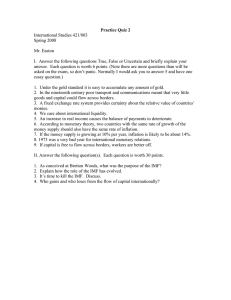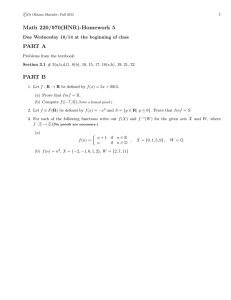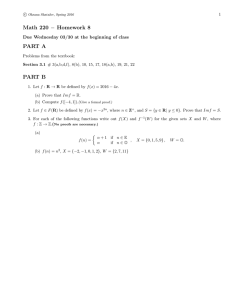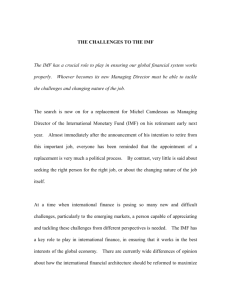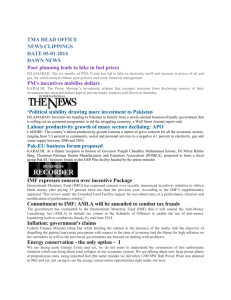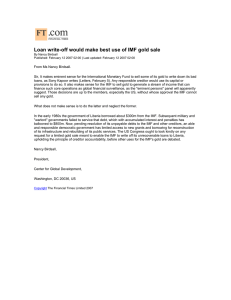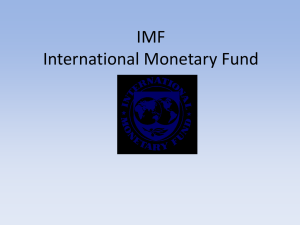Dear Ms. Birdsall:
advertisement
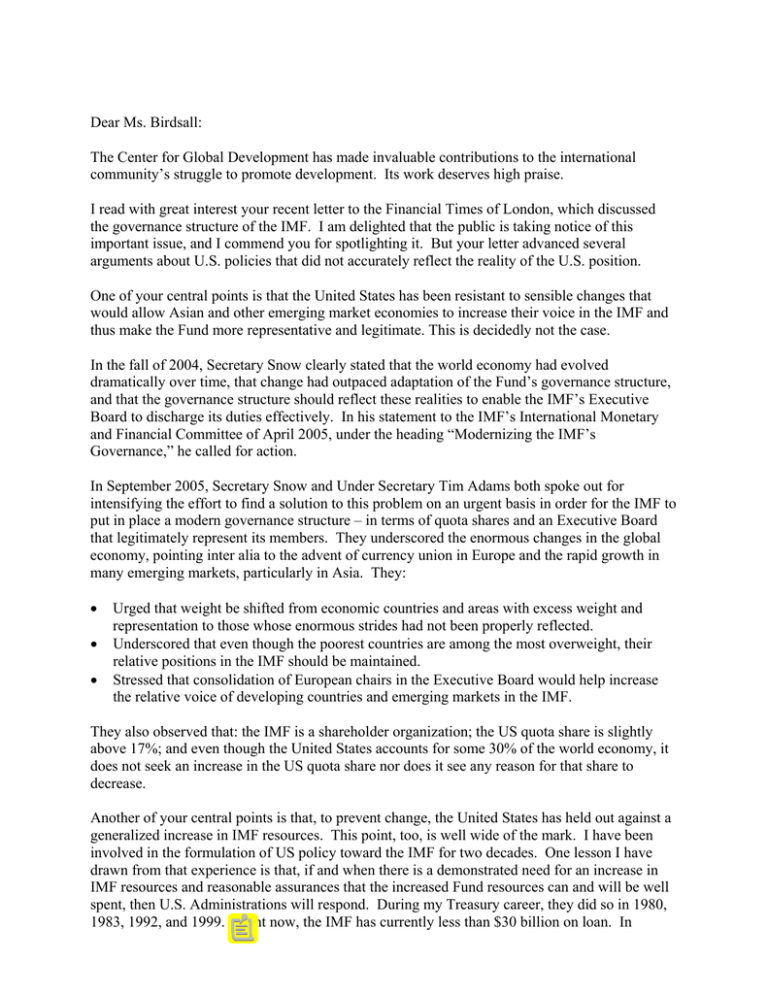
Dear Ms. Birdsall: The Center for Global Development has made invaluable contributions to the international community’s struggle to promote development. Its work deserves high praise. I read with great interest your recent letter to the Financial Times of London, which discussed the governance structure of the IMF. I am delighted that the public is taking notice of this important issue, and I commend you for spotlighting it. But your letter advanced several arguments about U.S. policies that did not accurately reflect the reality of the U.S. position. One of your central points is that the United States has been resistant to sensible changes that would allow Asian and other emerging market economies to increase their voice in the IMF and thus make the Fund more representative and legitimate. This is decidedly not the case. In the fall of 2004, Secretary Snow clearly stated that the world economy had evolved dramatically over time, that change had outpaced adaptation of the Fund’s governance structure, and that the governance structure should reflect these realities to enable the IMF’s Executive Board to discharge its duties effectively. In his statement to the IMF’s International Monetary and Financial Committee of April 2005, under the heading “Modernizing the IMF’s Governance,” he called for action. In September 2005, Secretary Snow and Under Secretary Tim Adams both spoke out for intensifying the effort to find a solution to this problem on an urgent basis in order for the IMF to put in place a modern governance structure – in terms of quota shares and an Executive Board that legitimately represent its members. They underscored the enormous changes in the global economy, pointing inter alia to the advent of currency union in Europe and the rapid growth in many emerging markets, particularly in Asia. They: • • • Urged that weight be shifted from economic countries and areas with excess weight and representation to those whose enormous strides had not been properly reflected. Underscored that even though the poorest countries are among the most overweight, their relative positions in the IMF should be maintained. Stressed that consolidation of European chairs in the Executive Board would help increase the relative voice of developing countries and emerging markets in the IMF. They also observed that: the IMF is a shareholder organization; the US quota share is slightly above 17%; and even though the United States accounts for some 30% of the world economy, it does not seek an increase in the US quota share nor does it see any reason for that share to decrease. Another of your central points is that, to prevent change, the United States has held out against a generalized increase in IMF resources. This point, too, is well wide of the mark. I have been involved in the formulation of US policy toward the IMF for two decades. One lesson I have drawn from that experience is that, if and when there is a demonstrated need for an increase in IMF resources and reasonable assurances that the increased Fund resources can and will be well spent, then U.S. Administrations will respond. During my Treasury career, they did so in 1980, 1983, 1992, and 1999. Right now, the IMF has currently less than $30 billion on loan. In contrast, it conservatively has $170 billion in available resources to lend. In addition, the IMF has emergency credit lines of another $50 billion. There is no compelling case for a general increase in IMF resources at this time. To be sure, not only is a general quota increase not needed, general quota increases are a very poor and ineffective way of achieving realignment at the IMF. The history of IMF quota increases clearly shows that a large portion of an increase is typically allocated on a pro rata (“equiproportional”) basis that locks in existing weights. In contrast, “selective” increases aimed at boosting the relative shares of the seriously under-weight countries are held to a minimum. This is but another reason why a serious rebalancing of quota shares is needed, rather than relying on business as usual. I have enclosed a compendium of quotations from Secretary Snow and Tim Adams on these topics. The United States has also been in the forefront in supporting a greater international role for emerging markets in other ways. The United States led international effort to launch the G-20 Finance Ministers and Central Bank Governors process -- which annually brings together representatives of the G-7 and key emerging markets -- and has remained a staunch supporter ever since. The United States has also consistently welcomed and encouraged meetings between G-7 officials and representatives of China, India, Brazil, South Africa, and Russia, especially at the Ministerial level. In the final analysis, the United States has been and remains firmly on record as calling for a greater voice for emerging markets in the international financial system and for fundamental modernization of the IMF’s governance structure. The United States supports a strong IMF as the central institution for global monetary cooperation and benefits enormously from the Fund’s playing that role. This reality remains as true today as it was some six decades ago when the IMF was founded. For the IMF to continue playing its role as a lynchpin of the international monetary system effectively and legitimately, the weights of many emerging markets need to be urgently enhanced and their voices at the table increasingly heard. In effecting necessary change at the IMF, the United States does not believe that tinkering around the edges is a sufficient response to the clear need for fundamental modernization. Sincerely, Mark Sobel The writer is Deputy Assistant Secretary for International Monetary and Financial Policy at the U.S. Treasury. In that capacity, he plays a key role in coordinating the US Treasury’s work for the G-7 and G-20 Finance Ministry processes and formulating policies regarding U.S. participation in the IMF. He has worked at the US Treasury for over 25 years. Secretary Snow at the IMFC on September 24, 2005 An effective IMF also needs a modern governance structure that legitimately represents its members. The IMF is a shareholder institution, and its governance needs to evolve to reflect developments in the global economy such as the growing weight of emerging markets particularly emerging Asia - and monetary union in Europe. We welcome the attention that quota reform has received in the months since we last met. This is an important start to an effort that will require a concerted, cooperative effort. With IMF liquidity at an historic high, a general quota increase remains unnecessary. In our view, members need to develop a plan for a voluntary transfer of quota shares from some of the most overweight to the most underweight large emerging market countries, while protecting the shares of the poorest countries. EU integration also needs to be better reflected in the governance structure. Addressing these issues will take time and will require leadership. For our part, the United States is not seeking additional quota, even though our quota share is quite small relative to our weight in global GDP. Increasing the quotas of underweight countries alone would raise the size of the IMF and result in a share reduction for all countries, whether merited or not; this is not an appropriate path. Under Secretary Adams at the Institute for International Economics on September 23, 2005 I am a believer in the IMF – that is, an IMF as a facilitator of international monetary cooperation. History has repeatedly demonstrated how much the world needs such an institution – from the maintenance of a fixed exchange rate system centered on the major industrialized countries in the 1950s and 60s, to the resolution of the Latin American debt crisis of the 1980s, to the economic transformation of Eastern Europe, to the emerging market crises of the 1990s. There is a role of for the Fund…. First, it is necessary for us to address the governance structure of the IMF. The IMF's governance structure should ensure that every member has a voice, with each country's vote scaled to reflect its weight in the world economy. This shareholder structure provides for both universal representation and weighted influence, while keeping the Fund's financial position strong so that it can meet its systemic responsibilities and come to the aid of members when needed. At the Spring Meetings of the IMF and World Bank, Secretary Snow stated that the governance of the IMF should evolve along with the world economy, so that countries have a rightful stake in the institution. The world economy has evolved considerably, as some countries have grown more quickly than others and Europe has achieved monetary union and deepened integration. The quotas for many fast-growing emerging market countries are much smaller than the IMF's own calculations would suggest they should be. For example, Korea is 66% underweight; Mexico about 35% underweight; and Turkey about 32% underweight. The IMF's quota formulas also do not reflect many countries' weight in the world economy. This is true for the United States, whose quota is 17% of the total while U.S. GDP was roughly 29% of global GDP in 2004. The IMF's liquidity is at a record high by any measure. There is no need to increase its resources – either through a general or an ad hoc increase. The United States is not seeking to increase its own quota share, and will not accept any decline. Rather, we wish to explore ways to improve the balance. Within that context, what can be done? • • • First, a voluntary rebalancing of quotas, within the existing total, from "overweight" countries to the most "underweight" emerging markets would be a major step forward. This will depend on countries whose quotas are out of proportion to their global economic weight stepping forward to help modernize the Fund. Second, the poorest countries are among the most overweight relative to calculated quota or share of GDP, but should be held harmless so that their quota does not fall. Third, in addition to rebalancing quotas, representation on the Executive Board should better reflect the IMF's full membership. Consolidation of European chairs would help to increase the relative voice of emerging market and developing country members. These are complex issues and the United States will not be able to effect change alone. But together, the IMF's membership can begin a process that will bring a better balance to IMF governance and that of the international financial institutions more broadly. Secretary Snow’s Statement to the IMFC on April 16, 2005 Modernizing the IMF's Governance: Last fall in my statement to this group I emphasized that the IMF is a financial and shareholder institution whose governance should evolve along with the world economy so that countries' positions better reflect their global weights and so that all members are more effectively represented. At that time, I underscored the reality that change in the world economy has outpaced that at the IMF, particularly given fast-paced GDP growth in emerging market economies and the advent of currency union in Europe. The IMF should recognize the enormous strides made by many fast-growing countries, particularly in Asia. We believe the time is ripe to start considering how to address these inter-related issues. The IMF's liquidity is at an all-time high. But the fact that the IMF does not need an increase in its resources need not impede change. A rebalancing of quotas from "over-represented" countries to the "under-represented" within the existing total could yield substantial progress. This will not be an easy task, but it can be achieved with boldness and vision to help modernize the Fund. These are clearly complex issues, and careful consideration and consultation is needed to address the full range of concerns. This is important to preserving the global character of the IMF, so that all countries feel they have a rightful stake in the institution. Secretary Snow’s Statement to the IMFC on October 2, 2004 The IMF is a financial institution of shareholders. Over time, the world economy has evolved, and the Fund's governance should evolve accordingly so that countries' positions better reflect their global weights and so the Board can continue to discharge its duties effectively. Already, change has outpaced that at the IMF. Many fast growing emerging markets clearly are playing roles in the world economy that far exceed their current IFI weights. Many parts of Europe have joined a currency union, while European representation accounts for roughly one-third of the Board's seats, and we are all watching moves toward further European integration. And, while many emerging markets are now a much larger share of the global economy, other countries have fallen behind. We will need to consider how to address these interrelated issues in the coming years.
